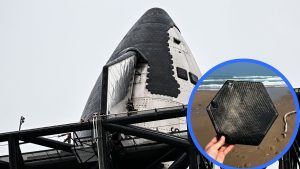Parliament And Space: Debris A ‘Critical’ Issue
10th Nov 2022
The commercial space sector is all about driving new disruptive technologies in orbit to benefit life on Earth. Parliament and space collided, however, in a new report released by the UK House of Commons all about the space industry. Parliament found several technological challenges the sector faces, such as the fragmented approach of space debris monitoring and removal between civil and defence authorities, and how the UK should take the opportunity of being world leaders of in-orbit manufacturing.
Commons released the report on 4th November in collaboration with the Science and Technology Committee. It is a culmination of findings from its inquiry into the UK space strategy and satellite infrastructure ecosystem. The inquiry began in April 2021, and the House of Commons has now set numerous recommendations for the government to respond to.
Space debris coordination
The report claimed it received a “wealth of evidence” during its inquiry about space debris and how it is a “critical issue” for the space industry to tackle. As space becomes more accessible and launch is cheaper, orbital debris continues to spiral into high numbers. As of March, this year, the European Space Agency’s Debris Office tracked almost 30,000 pieces of junk. However, the number is far grimmer, as ESA estimated there could be up to 36,500 objects in orbit more than 10cm in size, one million between 1 to 10cm, and up to 130 million between 1mm to 1cm. Even the smallest pieces of debris pose a threat to space infrastructure.
Catching up with the neighbours
ESA has its own Space Domain Awareness (SDA) programme to “provide Europe and its citizens with complete and accurate information on objects orbiting Earth, on the space environment and on threats coming from space” and the Japan Aerospace Exploration Agency (JAXA) has reportedly been tracking junk for decades. The UK National Space Strategy, which was published in September 2021, emphasized the importance of monitoring space debris and removing it from orbit. Published months later in February, the Defence Space Strategy also listed it as one of its priorities. However, the Commons report said it is “unclear” how SDA capabilities would be monitored between civil and defence.
“Although we believe that UK Space Agency (sponsored by BEIS) and the Ministry of Defence are both right to commit to improving their abilities to track and recognise objects in orbit (Space Situational Awareness /Space Domain Awareness), the two departments appear to be developing these capabilities independently, despite the previous Secretary of State for Business, Energy and Industrial Strategy’s claims about efforts to integrate and find synergies,” the report said. “We believe a joint approach to serving civil and military needs from these capabilities should be established. The Government should bring UKSA and MoD Space Situational Awareness/Space Domain Awareness services under one roof to maximise the use of knowledge, technology, and resources. The UK Space Command would be a perfect candidate for this as it already works alongside the UK Space Agency and Ministry of Defence to deliver joint national space capabilities.”
The report also said the UK should be clear with how it plans to collaborate with international partners on space debris monitoring and removal.
UK to lead in-orbit manufacturing
In-orbit manufacturing refers to the building and assembling of components in space rather than on the ground. Being able to manufacture spacecraft in-orbit means that structures can be repaired and updated in space, which is cheaper and reduces the risk of space debris. In a report released in May 2021 from the Satellite Applications Catapult, it found that the UK has an opportunity to become world leaders of the service.
While this type of technology is only being tested or in the early stage of launch across the world commercially, Cardiff-based Space Forge is one of the few companies in Europe making it happen. The company is creating a spacecraft, called ForgeStar, that will launch into space, manufacture products such as alloys, pharmaceuticals, and more by harnessing the benefits of zero gravity and the vacuum of space, and then bring it down back to Earth. The company is launching ForgeStar-0 with Virgin Orbit’s first UK launch in Cornwall later this year to test its heat shield and hopes to provide the service in the next year or so. While this company is spearheading in-orbit manufacturing, the report asserted that there should be more investment in this technology within the UK.
As Commons sees it
“Research has already shown the UK has the potential to be a world leader in the growing in-orbit services and manufacturing (IOSM) market. The Government should seize this opportunity,” the report said. “The Department for Business, Energy and Industrial Strategy and UK Space Agency (UKSA) should work with organisations and companies such as the Satellite Applications Catapult and Space Forge who have already set out the steps that the UK needs to take to maintain leadership in this area. UKSA should set out which parts of the Catapult’s proposals it plans to take forward and should set a budget for this work.”
The report also commended the shift toward the development of space-based solar power to reach the UK’s net zero goals. The government has two months to respond to the House of Commons’ recommendations.
Orbital Today has been looking at the other major points connecting Parliament and space in this new report.






Thank you for your comment! It will be visible on the site after moderation.